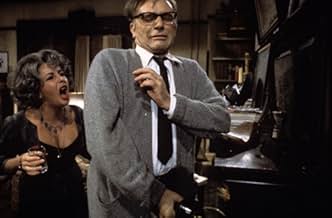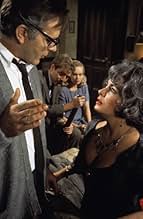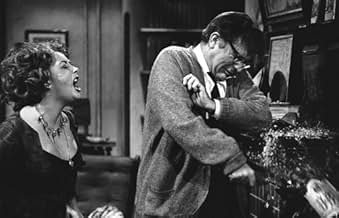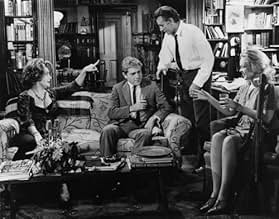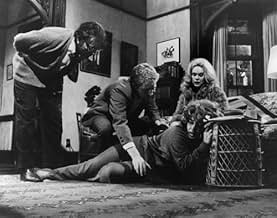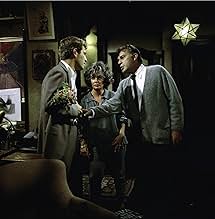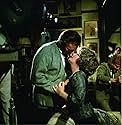IMDb-BEWERTUNG
8,0/10
81.507
IHRE BEWERTUNG
Ein verbittertes, in die Jahre gekommenes Ehepaar benutzt mit Hilfe von Alkohol ein anderes Paar dazu, sich gegenseitig zu quälen und emotional zu verletzen.Ein verbittertes, in die Jahre gekommenes Ehepaar benutzt mit Hilfe von Alkohol ein anderes Paar dazu, sich gegenseitig zu quälen und emotional zu verletzen.Ein verbittertes, in die Jahre gekommenes Ehepaar benutzt mit Hilfe von Alkohol ein anderes Paar dazu, sich gegenseitig zu quälen und emotional zu verletzen.
- 5 Oscars gewonnen
- 22 Gewinne & 26 Nominierungen insgesamt
Handlung
WUSSTEST DU SCHON:
- WissenswertesThis became the first movie in Academy Awards and cinema history to be nominated for every Academy Award category in which it was eligible, including Best Adapted Screenplay (Ernest Lehman), Director (Mike Nichols), all of the acting categories (Richard Burton, Dame Elizabeth Taylor, George Segal and Sandy Dennis) and Picture of the Year (Ernest Lehman), since Pioniere des wilden Westens (1931).
- PatzerThe four characters stop at a bar after the first soiree at George's house. It is clearly after 2:00 a.m., since the time was stated during the first segment. No bars, however, would have been open after 1 or 2 a.m. in the New England states, where the film is set.
- VerbindungenEdited from Das Geheimnis von Malampur (1940)
- SoundtracksWho's Afraid of Virginia Woolf?
(to the tune of "Here We Go Round the Mulberry Bush")
Traditional English melody
Original lyrics ("Who's Afraid of the Big Bad Wolf?") by Frank Churchill and Ann Ronell; modified by Edward Albee
Performed by Elizabeth Taylor
Ausgewählte Rezension
An undisputed classic that chronicles every appalling moment of a drunken night in hell as middle-aged George and Martha tear each other, and their guest, to pieces.
Elizabeth Taylor proves categorically that she was a truly great actress. Her Oscar-winning performance as the psychologically tormented Martha is one of the greatest performances in the history of cinema. Taylor's imperceptible shifting from sadism to tenderness, from bullying condescension to exhausted vulnerability, is a masterclass in character building. Martha is a truly monstrous character, and yet Taylor is able to imbue her with sympathy, allowing you brief glimpses of the warm and lovable woman she could have been.
Richard Burton is equally magnificent as George; an ageing, failing college professor whose initial meekness gives way to a raging torment all of his own. His verbal sparring with Taylor, like two pit-bulls in the ring of an endless and bloody dogfight, has become legendary. Every word drips with malice and contempt, every sentence is designed to cut the deepest wound. At times, it becomes painful to watch, but like true train-wreck television, you cannot drag yourself away from the inevitably terrible conclusion.
Quite possibly, this is as close to perfect as movies can get; beautifully written dialogue, deeply complex characters, an evolving and suspenseful storyline, beautiful photography, and a wonderfully understated score by Alex North. Nominated for 13 Academy Awards in 1967, but lost out to A Man for All Seasons and Born Free to win only 5.
"Who's Afraid of Virginia Woolf?" "I am."
Elizabeth Taylor proves categorically that she was a truly great actress. Her Oscar-winning performance as the psychologically tormented Martha is one of the greatest performances in the history of cinema. Taylor's imperceptible shifting from sadism to tenderness, from bullying condescension to exhausted vulnerability, is a masterclass in character building. Martha is a truly monstrous character, and yet Taylor is able to imbue her with sympathy, allowing you brief glimpses of the warm and lovable woman she could have been.
Richard Burton is equally magnificent as George; an ageing, failing college professor whose initial meekness gives way to a raging torment all of his own. His verbal sparring with Taylor, like two pit-bulls in the ring of an endless and bloody dogfight, has become legendary. Every word drips with malice and contempt, every sentence is designed to cut the deepest wound. At times, it becomes painful to watch, but like true train-wreck television, you cannot drag yourself away from the inevitably terrible conclusion.
Quite possibly, this is as close to perfect as movies can get; beautifully written dialogue, deeply complex characters, an evolving and suspenseful storyline, beautiful photography, and a wonderfully understated score by Alex North. Nominated for 13 Academy Awards in 1967, but lost out to A Man for All Seasons and Born Free to win only 5.
"Who's Afraid of Virginia Woolf?" "I am."
Top-Auswahl
Melde dich zum Bewerten an und greife auf die Watchlist für personalisierte Empfehlungen zu.
Details
- Erscheinungsdatum
- Herkunftsland
- Sprachen
- Auch bekannt als
- Who's Afraid of Virginia Woolf?
- Drehorte
- Cambridge, Massachusetts, USA(location)
- Produktionsfirmen
- Weitere beteiligte Unternehmen bei IMDbPro anzeigen
Box Office
- Budget
- 7.500.000 $ (geschätzt)
- Bruttoertrag in den USA und Kanada
- 28.000.000 $
- Weltweiter Bruttoertrag
- 28.006.929 $
- Laufzeit2 Stunden 11 Minuten
- Farbe
- Sound-Mix
- Seitenverhältnis
- 1.85 : 1
Zu dieser Seite beitragen
Bearbeitung vorschlagen oder fehlenden Inhalt hinzufügen

Oberste Lücke
By what name was Wer hat Angst vor Virginia Woolf? (1966) officially released in India in English?
Antwort

